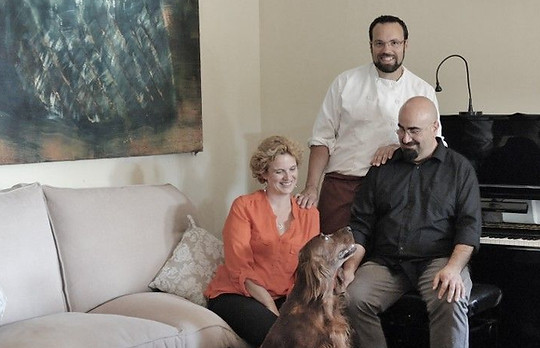FARM LA FRONDA and WORDSWORTH
Our story begins in 2004, when Charles W. Wordsworth, after a long carrere travelling the world, Lima, London, Germany or Madrid, decides to retire to Sierra de Aracena with his wife Reyes.

It took 4 years to build and open Finca la Fronda to the public. One of his main concerns was for the hotel to blend into its surroundings, and for it to be as sustainable as possible. After all Finca la Fronda had to be a comfortable hideaway for nature lovers that came to visit this beautiful and very unspoilt area of Spain.

His youngest son Alec, soon came and joined the project, and a few years later his eldest daughter Cristina and her partner Oscar. The three of them with the help of Mary, are the team that hope to make your stay at Finca la Fronda unforgettable.

But it is possible that Finca la Fronda's story started way back in the year 1770 in Grasmere, England. William Wordsworth, poet laureate, and forefather of the Romantic Age in English Literature, was Charles's great, great grandfather. If there is a common theme in all of Wordsworth's works it is nature. Curiously the Lake District, from where the poet came from, has many similarities with the Natural Park of Sierra de Aracena. Both of them are protected natural reserves, and realistic symbols of conservation of the rural and natural environment.
For this reason Wordsworth's poems and the admiration for nature are Finca la Fronda's trademark.
COMMITMENT TO OUR NATURAL ENVIRONMENT
Following the example of love and respect for nature of our ancestor en Finca La Fronda we take all the measures within our reach.
The construction of the building was made taking care that the visual impact was minimal, on a single floor, with traditional materials, without altering the surrounding flora, with thermal and acoustic insulation criteria, with low intensity lighting that does not pollute the night sky.
The farm has photovoltaic and thermal solar energy installations.
All the water comes from a well and is purified and then reused on the property.
The commitment to local producers reaches our kitchen, and where it is not enough, we care that the products are ecological and minimize the use of plastics in packaging.
The organic remains are composted on the farm and the compost is used as fertilizer for the native plants.
Parallel to the hotel activity, they take advantage of the farm's natural resources in a traditional way (chestnut harvesting, cork removal). In gardening, priority is given to native and well-adapted species, with low water consumption._cc781905-5cde- 3194-bb3b-136bad5cf58d_
We collaborate with local artists by facilitating book launches and exhibitions.
